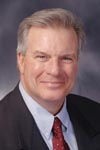JEFFERSON CITY, Mo – On the heels of the overearnings announcement by one investor-owned utility, the House Utilities Committee is currently struggling with legislation that would allow them to make a larger profit.
HB 2078, sponsored by Rep. Doug Funderburk, R-St. Peters, would create a tracking for two particular expenses for utility companies: transmission fees and property taxes. Those trackers would be submitted to the Public Service Commission to consider when it creates rates.
Funderburk contends that the tracker only provides a more accurate measure to determine expenses, while admitting that it would force those expenses to always be taken into account.

“Seventy-five years ago they weren’t looking at these high property tax costs,” he said. “We’re bringing a 20th Century thing into the 21st Century,”
He added that the bill affects Kansas City Power and Light and Empire Electric more than Ameren.
Ameren admitted to over earning by at least $29 million in 2013; Fair Energy Rate Action Fund feels the number is closer to $100 million. Ameren already has a system to track transmission costs – its fuel surcharge rate. Neither KCP&L nor Empire have such a tracker.
However, there have been obstacles to this legislation. The plan to pass the bill out of committee last Wednesday, but before the meeting began plans changed due to mounting opposition.
“I had the votes to pass it but I wanted to work with a couple more members of the committee. I wanted to find out what objections were. I recorded zero input from the committee. I just wasn’t comfortable with some of the no votes,” Funderburk said. “I wanted to make sure the team is on board. Just because I’m chairman doesn’t mean I should drive everything through that I want. I would rather be a leader on this than a dictator. You force a bill through committee and it will be hell on the floor.”
He’s offering an amendment. He said it is not finalized but it definitely excludes Ameren from the Transmission portion of the bill. Funderburk also said he was going to talk to members of the committee Tuesday and the transmission tracker might be excluded completely.
“The property taxes are key for KCP&L and Empire.”
However, some members of the committee are opposed to bill in its current form, including some traditional allies.
Rep. Ron Hicks, R-St. Peters said, “Right now were sitting this aside because we didn’t have the votes yet. I’m not a big fan of the tracker in this case I wonder if this is us stepping on the job of the PSC. I’m willing it listen on this one. It’s the first time I haven’t been just 100% with my chairman.”
Rep. Chuck Gatschenberger, R-Lake St. Louis, previously supported the bill but is now in opposition.
“I’ve had a barrage of phone calls against the tracker. I can’t go for it, the PSC is supposed to decide that,” he said.
Rep. Holly Rehder, R-Sikeston, is a traditional ratepayer advocate and is also opposed.

“I asked Ameren supporters to present the case to me one more time and I told them I felt it was the cost of doing business,” she said. “The competition is what keeps most businesses costs down where Ameren doesn’t have that.”
Chris Roepe of the Fair Energy Rate Action Fund, contends the bill would create metrics that would always be charged. Property taxes and transmission fees happen to be expenses that always increase. There are multiple factors that lower costs including refinancing debt, renegotiating union contracts and technological advances.
Roepe said this system would allow utilities to double charge. Transmission fees and property taxes are already considered by the PSC when setting rates.
“This is a risk transfer,” Roepe said. “It’s like you going on vacation with my credit card. We argue a tracker in Missouri is unlawful.”
However, it is Ameren’s involvement has inspired the most ire from opponents. Diana Vuylsteke represents the Missouri Industrial Energy Consumers and the 16 top ratepayers in the state.
“Right now they’re overearning and they would be able to get a rate increase for construction,” Vuylsteke said. “They already have more plants than they know what to do with.”
Irl Scissors, with Missourians for a Balanced Energy Future, had a different take.
“HB 2078 will encourage significant investment in electrical infrastructure and create new jobs at absolute minimal cost to Missouri consumers,” he said.
In a sign that the current over earnings and rate adjustment cases before the PSC may be spilling over into this debate in response to a question about the HB 2078. Rep. Keith English, D-Florissant, serves on the Utilities Committee and is a committed utility supporter.
“I think Ameren needs to divorce itself from Noranda and let them find out what electricity really costs,” he said. “I will not stand for big businesses like Noranda holding electricity users hostage and make the little guys pay higher rates.”
If the bill were to leave committee there is likely a bloody fight in store on the House floor and the bill faces and uncertain fate in the Senate.
Sen. Wayne Wallingford, R-Cape Girardeau, one of the opponents of last session ISRS legislation.
“I don’t know what will happen in the Senate, however in general, I am opposed to tracker legislation,” Wallingford said. “Time is the enemy for a bill like that. We’ve got Easter break coming up. Energy bills get a lot of discussion on the floor. There’s people on both sides of the issue. It’s against the odds, not that it can’t happen.”



